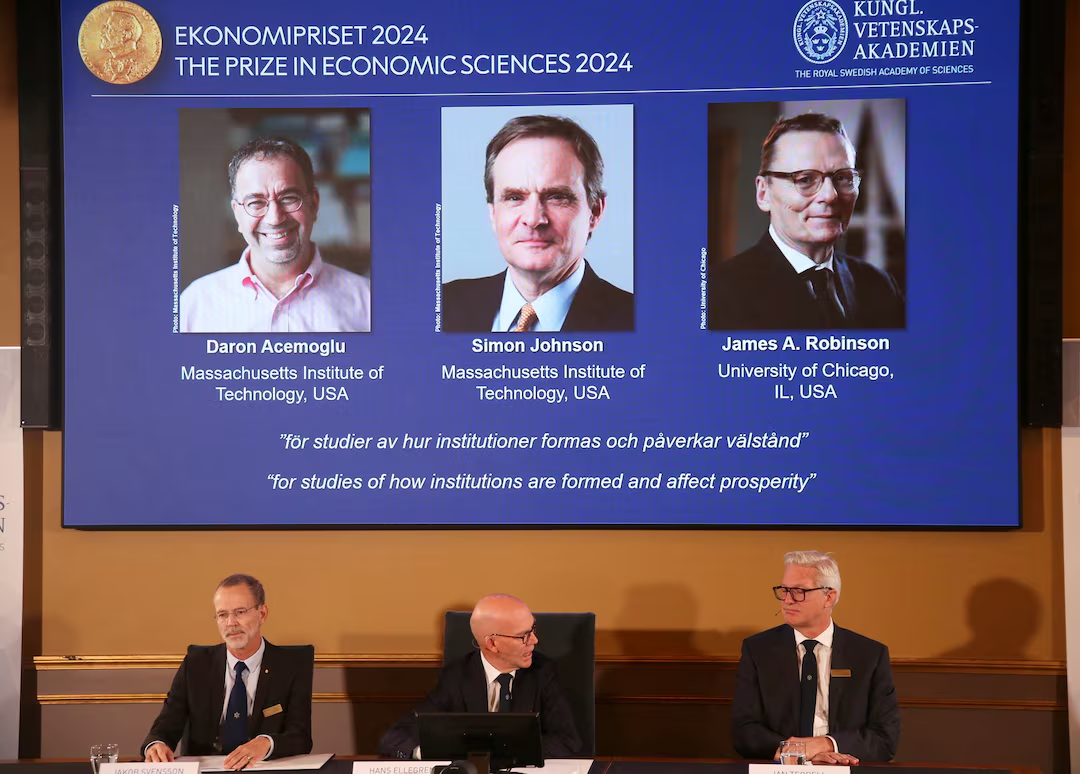
Three U.S.-based economists, Simon Johnson, James Robinson, and Daron Acemoglu, were awarded the 2024 Nobel Prize in Economic Sciences for their groundbreaking research on the long-lasting impact of colonialism on global inequality. Their work, which explores how institutions are formed and how they shape prosperity, has been pivotal in understanding why many low-income countries continue to struggle with poverty, corruption, and dictatorship. The Nobel Committee praised their research for identifying the historical roots of weak institutional environments in countries that remain economically disadvantaged.

Jakob Svensson, the chair of the Nobel Prize Committee, highlighted the significance of the economists’ work in addressing one of today’s most pressing global challenges: reducing income inequality between nations. According to the committee, the researchers’ work offers critical insights into the persistent barriers faced by many countries in achieving economic growth and stability. Their studies emphasize the importance of the institutions established during colonization and how they continue to impact countries’ economic trajectories.
The award comes in the context of a grim economic reality. A World Bank report released just a day earlier revealed that the 26 poorest countries, home to 40% of the world’s poorest people, are now deeper in debt than ever before. This highlights a major setback in the global fight against poverty, which the Nobel laureates’ research could help better address through its exploration of how institutional weaknesses can lead to stagnation.

Acemoglu, a Turkish-American professor, spoke to reporters in Athens about how weakening public institutions and the erosion of the rule of law are global concerns. He also made a reference to China, describing its rapid growth as “a bit of a challenge” due to its authoritarian regime. Johnson, meanwhile, highlighted the stresses being placed on established institutions in the United States, especially in the wake of former President Donald Trump’s refusal to acknowledge his 2020 election loss, which he described as a “serious stress test” for American democracy.
The laureates’ research delves into how European colonization had profound but unequal impacts on various regions of the world. They found that colonization could either be exploitative or constructive, depending on whether colonizers set up institutions that benefited local populations or were primarily focused on extracting resources for themselves. This divergent approach resulted in a “reversal of fortune” in many cases, where regions that were once wealthy became impoverished, while other areas that received more attention to institutional development eventually thrived.

Their study also noted the correlation between the mortality rates of colonizers and the prosperity of the regions they occupied. The higher the mortality rates among the colonizers, the poorer the present-day economic outcomes for the area. This “dangerous” aspect of colonization has far-reaching implications for understanding contemporary inequalities, especially in regions that experienced high levels of colonizer death.

Although the economics prize is not one of the original Nobel awards established by Alfred Nobel’s will, it has become one of the most prestigious awards for economic thought since its creation in 1968. Past recipients of the prize include influential figures like Milton Friedman, John Nash, and Ben Bernanke, who have all shaped economic discourse over the years. The prize not only acknowledges the winners’ contributions to economics but also underscores the importance of economic research in addressing global challenges.
Research into inequality has been a key focus of recent Nobel Prize awards. In 2023, Harvard historian Claudia Goldin won for her work on wage and labor market inequalities between men and women. The 2019 prize was awarded to economists Abhijit Banerjee, Esther Duflo, and Michael Kremer for their pioneering work in poverty alleviation. These trends reflect the growing importance of addressing inequality in economic research and policy-making.
The dominance of U.S.-based academics in the field of economics continues to be a notable feature of the Nobel Prize. U.S. scholars have accounted for a significant portion of the awardees in recent years, and they also make up a large part of the winners in other scientific fields. The 2024 Nobel Prize announcements for medicine and peace, for example, also featured U.S.-based laureates, demonstrating the continued global influence of American research institutions.

As global inequalities remain a critical concern for economists, policymakers, and activists alike, the Nobel Prize in Economic Sciences serves as a reminder of the enduring legacies of historical events like colonization. The work of Acemoglu, Johnson, and Robinson continues to provide valuable insights into the complex interplay between institutions and economic development, offering new approaches to addressing some of the most persistent challenges in global economics today.




